Level Up Your Leasing Game: Choosing the Right Software
Managing multiple properties is complex. Streamline operations and maximize profits with the right property management software. This property management software comparison analyzes ten popular platforms—from Showdigs to TenantCloud—breaking down their strengths and weaknesses. We'll cover Showdigs, AppFolio, Buildium, Yardi Breeze, PropertyMe, Propertyware, Rentec Direct, MRI Software, Entrata, and TenantCloud, helping you choose the software that best fits your portfolio and simplifies your property management tasks. Find the perfect tool to optimize your business, whether you manage a few units or a large portfolio.
Key Takeaways
- Showdigs excels at single-family leasing automation - Built-in HUD compliance and AI-powered features for 200+ door portfolios
- Compliance automation prevents legal risk - Built-in Fair Housing protections are essential, not optional
- Portfolio size and type drive selection - Single-family scattered-site needs differ dramatically from centralized multifamily
- Total cost includes hidden fees - Evaluate per-unit pricing, transaction fees, and add-on costs, not just base subscription
1. Showdigs
Showdigs distinguishes itself in the property management software comparison landscape by offering a pioneering AI-powered leasing automation platform specifically designed for single-family property managers. This innovative solution tackles the entire rental lifecycle, from initial listing to securing a qualified tenant, streamlining operations and significantly reducing vacancy periods. By uniquely combining advanced software with a network of on-demand agents, Showdigs automates showings—offering in-person, virtual, and self-guided tour options—effectively catering to the preferences of today's renters. This flexibility significantly expands showing availability and accelerates the leasing process, resulting in faster tenant placement and increased revenue generation. Its focus on automation frees up property managers to focus on higher-value tasks, making it a powerful tool in a competitive market.
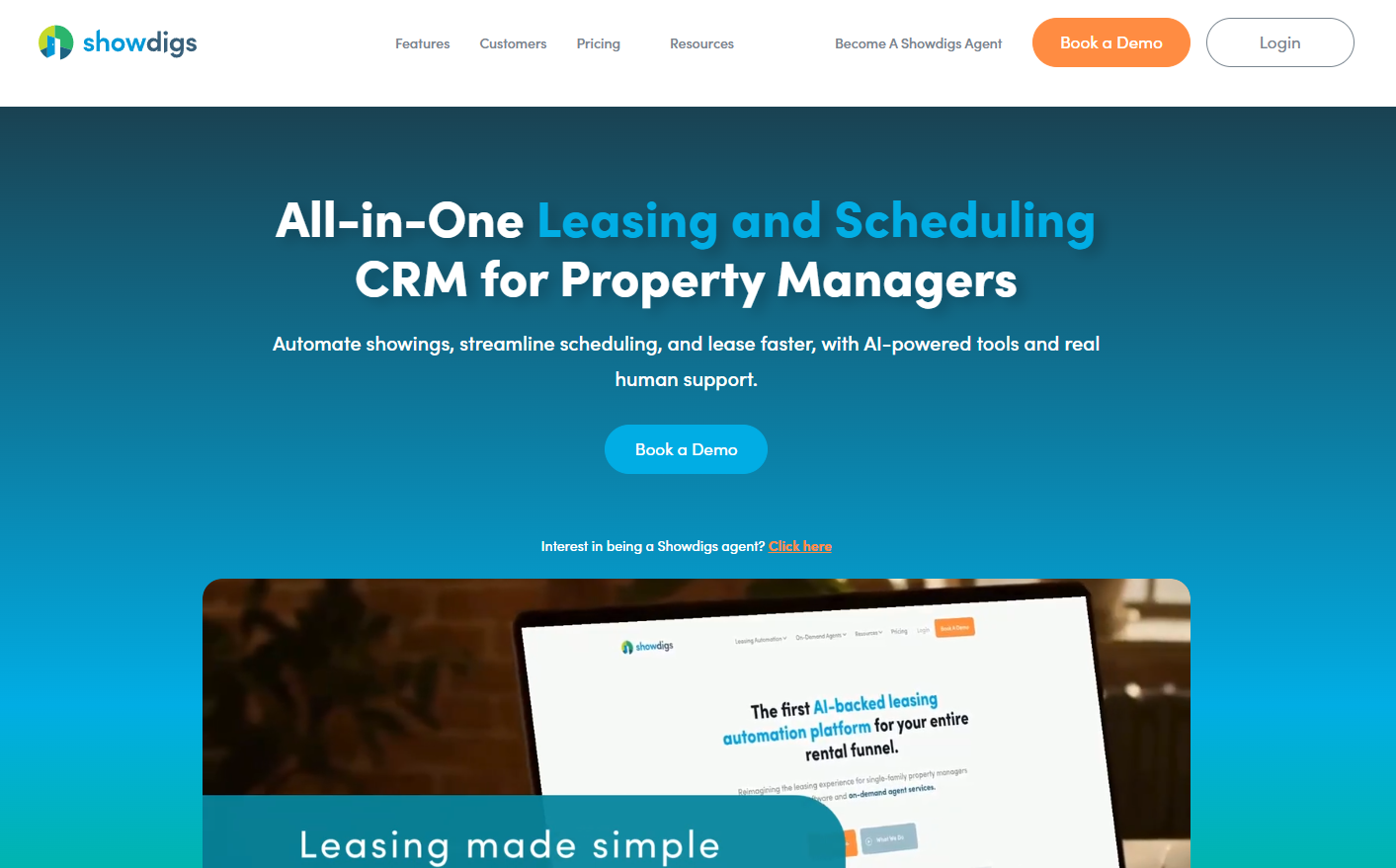
What sets Showdigs apart in 2026:
Showdigs continues to lead the single-family property management space with cutting-edge AI automation that goes far beyond basic software solutions. The platform's built-in HUD compliance ensures every screening and leasing workflow meets federal Fair Housing requirements automatically—eliminating regulatory risk while maximizing operational efficiency. This compliance-first approach, combined with intelligent prospect pre-qualification and flexible showing options, positions Showdigs as the gold standard for property managers who refuse to compromise on either speed or quality.
A key strength of Showdigs lies in its seamless integrations with leading property management software solutions like AppFolio and Yardi. This interoperability streamlines workflows by centralizing lead communication, scheduling, and follow-up processes within a single, unified platform. Furthermore, Showdigs leverages AI-powered tenant pre-screening, enabling property managers to quickly assess applicant suitability and make informed decisions, ultimately enhancing tenant quality and minimizing potential risks.
Property managers using Showdigs report dramatic improvements in key metrics: increased portfolio size per manager, reduced days on market, and significantly improved tenant quality through automated pre-qualification. The real-time leasing funnel visibility provides unprecedented insight into pipeline performance, allowing data-driven decisions that optimize every stage of the rental process. The platform also extends its automation capabilities to include on-demand condition reports and photo services, simplifying property inspections and further reducing administrative burdens.
Features:
- AI-powered leasing automation with intelligent prospect qualification
- Built-in HUD compliance - automated Fair Housing compliance across all workflows
- On-demand in-person, virtual, and self-guided tours with licensed agents
- Integration with AppFolio, Yardi, and major property management systems
- AI-driven tenant pre-screening for improved applicant quality
- Automated condition reports and photo services
- Real-time leasing funnel with performance analytics
- Marketing automation syndicating to 30+ listing sites
- Custom reporting and analytics
Pros:
- Comprehensive automation of the rental process from lead generation to tenant placement, reducing vacancy time
- Built-in HUD compliance eliminates Fair Housing risk automatically
- Flexible showing options including in-person, virtual, self-scheduled tours, and on-demand agent showings
- Seamless integration with major property management software like AppFolio and Yardi
- AI-powered tenant pre-screening to improve applicant quality and accelerate decision-making
- Real-time pipeline visibility with performance metrics
- Highly praised for excellent customer service and operational support, boosting property manager productivity
- Purpose-built for single-family property management
Cons:
- Showdigs Agents require an active subscription, potentially limiting flexibility for occasional users
- Recommended for property managers with a minimum portfolio size of 200 doors, which may exclude smaller landlords
- Pricing information is not readily available on the website, suggesting a tailored pricing model based on portfolio size and specific needs
Implementation Tip: Begin by scheduling a demo and discussing your specific needs with the Showdigs team to determine the best plan and integration strategy for your portfolio.
Why Showdigs Deserves Its Place in the List:
In a property management software comparison, Showdigs stands out for its innovative approach to leasing automation. Its combination of AI-powered tools, built-in HUD compliance, flexible showing options, and seamless integrations addresses key pain points for property managers, particularly those overseeing larger portfolios. While the portfolio size recommendation may not suit all, its comprehensive features, automated compliance protections, and focus on efficiency make it a compelling option for those seeking to streamline their leasing process, eliminate regulatory risk, and maximize ROI. For property managers juggling numerous properties and seeking to optimize their operations, Showdigs offers a significant advantage in the competitive rental market. Visit their website at https://showdigs.com to learn more.
2. AppFolio
AppFolio Property Manager secures the #2 position in this property management software comparison as a comprehensive, cloud-based solution designed for property management professionals overseeing residential, commercial, student housing, and community association properties. This enterprise-grade platform excels in streamlining daily operations, encompassing everything from marketing vacant units and managing tenant applications to collecting rent and generating comprehensive financial reports. Its modern, user-friendly interface, coupled with excellent mobile functionality, makes it a strong contender in the market, particularly for mid-size to large property management companies seeking an all-in-one solution.
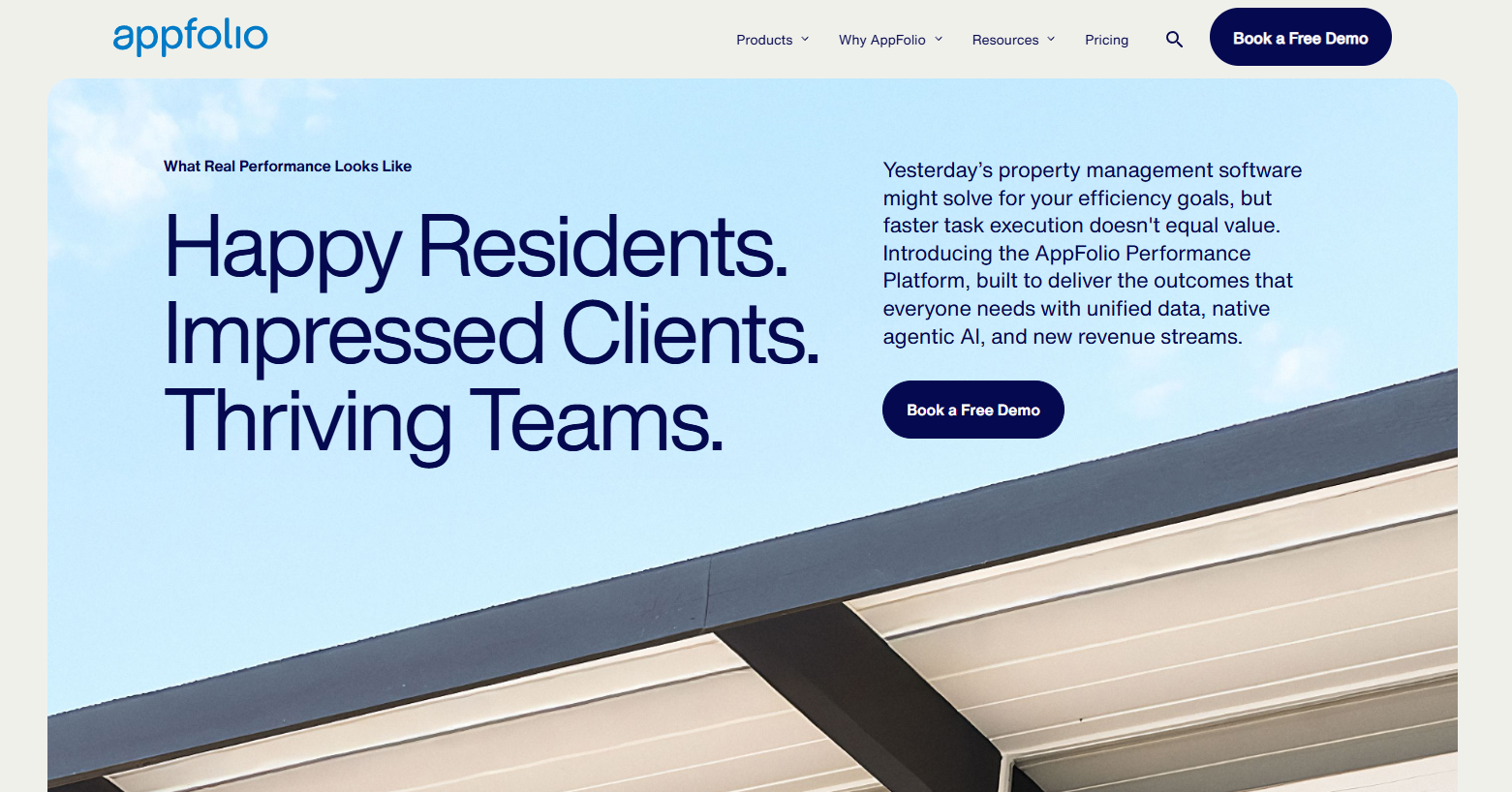
What makes AppFolio powerful in 2026:
AppFolio continues to invest heavily in AI and automation, positioning itself as a comprehensive property management ecosystem rather than just software. Recent updates include enhanced AI-powered screening recommendations, automated prospect communication, and predictive analytics that help property managers identify high-quality applicants faster. The platform's AI leasing assistant, Lisa, provides 24/7 responses to tenant inquiries, ensuring prompt communication and lead nurturing even outside business hours.
AppFolio earns its place on this list due to its focus on automation and efficiency. Features like online rent payments and leasing, coupled with an AI leasing assistant and automated showing coordination, significantly reduce administrative burden. The smart maintenance management system streamlines maintenance requests and tracking, while customizable owner and tenant portals enhance transparency and communication. Built-in marketing tools, including a website builder, further empower property managers to attract and retain tenants.
For property managers juggling numerous units, AppFolio's automation features are transformative. Tasks like online leasing with digital applications and integrated tenant screening (including credit and background checks) are significantly expedited. The platform's reporting and analytics capabilities are enterprise-grade, providing deep insights into leasing velocity, conversion rates, and pipeline health across entire portfolios.
For single-family property managers with larger portfolios, AppFolio's comprehensive reporting and accounting tools offer valuable insights into financial performance. Property management companies can leverage the platform to manage multiple properties and owner accounts efficiently. Large rental portfolio owners benefit from the automated workflows and robust communication features, while tenant placement companies can utilize the AI leasing assistant and marketing tools to expedite the leasing process.
For property management companies already using AppFolio for operations, the integrated approach eliminates the need for separate leasing software. All prospect data, communication history, and application materials flow directly into tenant records upon lease signing, creating a seamless transition and comprehensive audit trail. The platform's mobile app ensures leasing teams can manage prospects, schedule showings, and respond to inquiries from anywhere.
Features:
- Enterprise-grade platform integrating leasing, operations, and accounting
- Online leasing with digital applications and integrated screening
- AI-powered screening recommendations and lead scoring
- AI leasing assistant (Lisa) for 24/7 inquiry responses and lead nurturing
- Smart bill entry and vendor payment automation
- Integrated tenant screening with credit and background checks
- Owner/investor portals with real-time financial reporting
- Comprehensive marketing tools, including website creation and listing syndication
- Advanced analytics and leasing performance dashboards
- Mobile app for on-the-go property and leasing team management
- Customizable workflows and automation rules
Pros:
- Modern, intuitive user interface: Makes navigation and daily tasks easy to manage
- Excellent mobile experience for managers and tenants: Provides on-the-go access to crucial information
- Comprehensive reporting and strong accounting tools: Enables data-driven decision-making
- AI-powered features enhance efficiency and decision-making
- Top-rated customer support with dedicated account managers: Ensures prompt assistance and personalized guidance
- Enterprise-grade reporting and analytics
- Seamless data flow from prospect to tenant
Cons:
- Higher minimum monthly fee: Less suitable for smaller portfolios (typically requires 50+ units)
- Some advanced features require higher tier subscriptions: Can increase overall cost
- Limited customization for certain automated workflows: May not fit all unique business processes
- Steeper learning curve due to extensive feature set
- Some users report challenges with the initial data migration: Requires careful planning and execution
Implementation Tip: When migrating data to AppFolio, dedicate sufficient time and resources to ensure a smooth transition. Leverage AppFolio's customer support and resources to address any challenges during the setup process.
Comparison with Similar Tools: While Buildium and Propertyware offer similar functionalities, AppFolio differentiates itself with its modern interface, AI-powered features, and focus on larger portfolios. If you're managing a smaller portfolio, Buildium or other solutions might be more cost-effective.
Website: https://www.appfolio.com/
AppFolio earns the #2 position due to its comprehensive features, robust automation, enterprise-grade analytics, and user-friendly design. While the price point and unit minimum may be barriers for some, its powerful capabilities make it an excellent choice for mid-size to large property management companies seeking a comprehensive, all-in-one solution that combines property management with sophisticated leasing automation.
3. Buildium
Buildium is a robust, cloud-based property management software solution tailored for various residential property types, including single-family homes, student housing, affordable housing, and community associations. In a property management software comparison, Buildium stands out for its comprehensive suite of features, designed to streamline operations for property managers handling multiple properties. It shines with its powerful accounting tools and dedicated tenant/owner portals that simplify communication and rent collection. This makes it an excellent option for property management companies and large rental portfolio owners looking for an all-in-one solution.
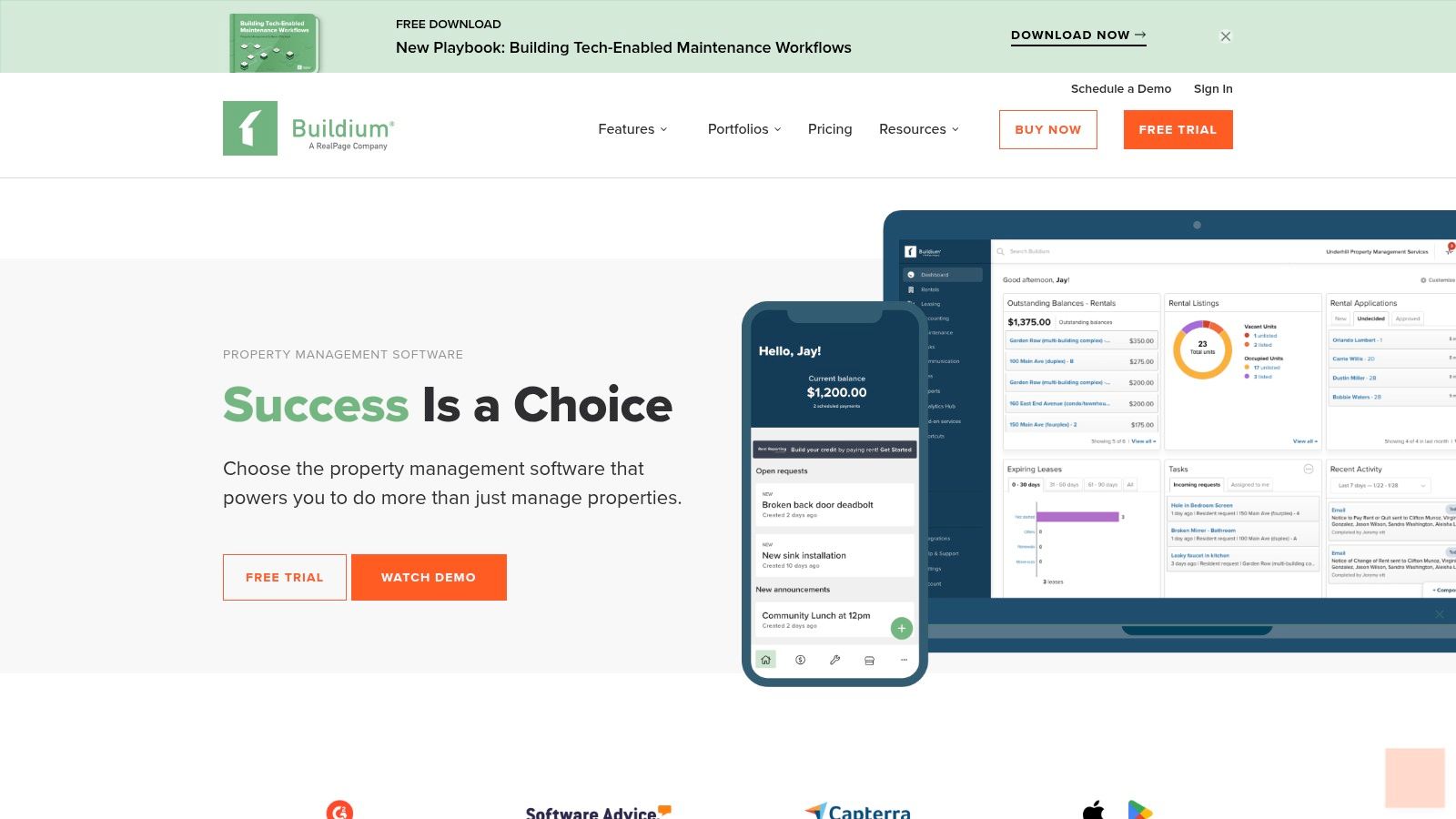
Buildium offers a full accounting system with bank reconciliation, enabling accurate financial tracking and reporting. Online rent collection through the tenant portal simplifies payment processing and reduces late payments. Automated maintenance request tracking and vendor management ensures timely responses to tenant issues. Secure document storage and sharing facilitates organized record-keeping. Built-in marketing tools with vacancy listings assist in attracting new tenants and minimizing vacancy periods. This comprehensive approach significantly benefits single-family property managers and tenant placement companies by centralizing crucial tasks.
Features:
- Full accounting system with bank reconciliation
- Online rent collection and tenant portals
- Maintenance request tracking and vendor management
- Document storage and sharing
- Built-in marketing tools with vacancy listings
Pros:
- Comprehensive all-in-one solution for residential property management
- Strong accounting capabilities with detailed financial reporting
- Excellent mobile app functionality, offering convenient access for managers on the go
- Scalable from small to large portfolios, making it suitable for businesses of all sizes
Cons:
- Steeper learning curve for new users due to the extensive feature set
- Higher pricing tiers compared to some competitors, which might be a barrier for smaller businesses
- Some users report occasional slow customer support response times
- More complex setup process than simpler alternatives, requiring more initial time investment
Website: https://www.buildium.com/
Pricing: While specific pricing isn't publicly available, Buildium offers tiered pricing based on the number of units managed, starting at around $50 per month. Contact Buildium directly for a customized quote.
Technical Requirements: Buildium is a cloud-based solution, accessible through any modern web browser. They also offer mobile apps for iOS and Android devices.
Implementation/Setup Tips:
- Take advantage of Buildium's onboarding resources and training materials to familiarize yourself with the platform
- Import existing data from spreadsheets or other property management software to streamline the setup process
- Customize the tenant and owner portals to reflect your branding and provide relevant information
Buildium earns its place in this property management software comparison due to its comprehensive nature and focus on residential properties. While it might have a steeper learning curve and higher price point than some competitors, its robust accounting tools, communication features, and scalability make it a valuable investment for property managers seeking a powerful, all-in-one solution. It's particularly beneficial for those managing larger portfolios or seeking in-depth financial reporting capabilities. If you're willing to invest the time in learning the system, Buildium can significantly enhance your property management efficiency and streamline your workflow.
4. Yardi Breeze
Yardi Breeze is a refreshing entry in the property management software comparison landscape, specifically designed for smaller to mid-sized property portfolios. This cloud-based solution offers an intuitive platform for managing residential, commercial, and mixed portfolios, providing essential tools within a clean, modern interface that requires minimal training. This makes it an attractive option for those looking to streamline operations without a steep learning curve or hefty investment in enterprise-grade solutions. If you're seeking efficient management without the complexities of larger systems, Yardi Breeze may be the right fit.
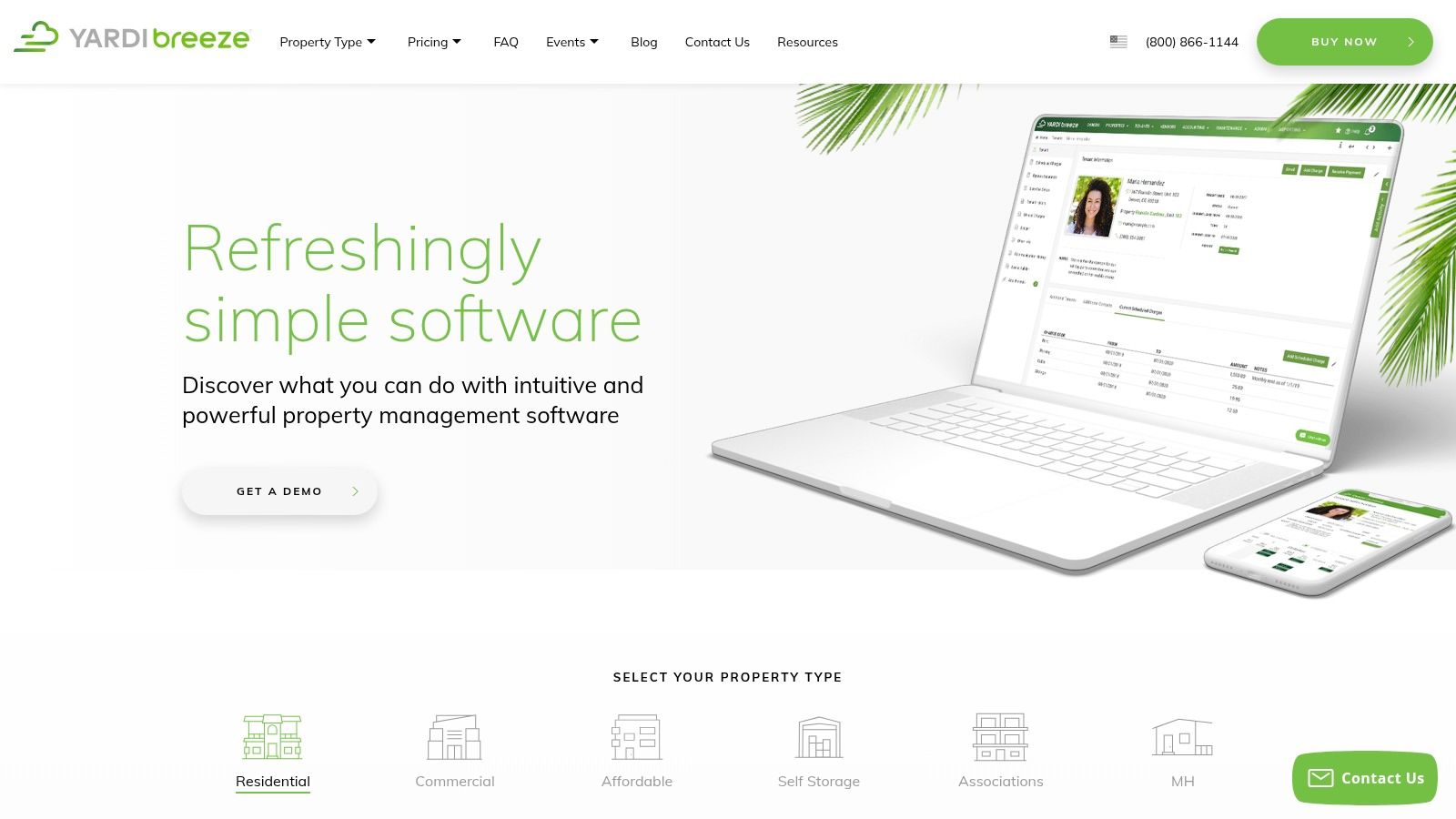
For single-family property managers, tenant placement companies, and those handling smaller portfolios, Yardi Breeze offers an accessible way to handle core functions like online applications, lease tracking, and maintenance requests. Property management companies with a mix of residential and commercial properties will also appreciate the flexibility of the software. Even large rental portfolio owners looking for a simplified solution for a segment of their holdings could find value in Yardi Breeze's focused feature set.
Key features of Yardi Breeze contribute to its position in this property management software comparison: simplified accounting and financial reporting provide readily accessible insights into your portfolio's performance; dedicated tenant and owner portals facilitate communication and transparency; online applications and leasing streamline the tenant acquisition process; maintenance request management keeps properties in top shape; and integrated marketing tools with automatic listing syndication expand your reach to prospective tenants.
Pros:
- Highly intuitive interface: Minimizes training time and allows for quick adoption across teams
- Responsive customer support: Provides assistance when needed, contributing to a smoother user experience
- No long-term contract requirements: Offers flexibility and avoids vendor lock-in, appealing to businesses of all sizes
- Reasonable pricing for smaller portfolios: Makes professional property management software accessible without a significant financial burden
Cons:
- Fewer advanced features compared to Yardi Voyager: May not be suitable for larger enterprises requiring sophisticated functionalities. For example, robust customization and reporting capabilities are limited compared to the enterprise-grade Yardi Voyager
- Limited customization options: Restricts tailoring the software to highly specific workflows
- Some users report occasional performance issues: This can disrupt workflows and impact productivity
- Mobile app has fewer capabilities than desktop version: Limits on-the-go access to certain features
While pricing details aren't readily published, Yardi Breeze operates on a tiered subscription model based on the number of units managed. This makes it scalable for growing portfolios. Technical requirements are minimal as it's a cloud-based solution accessible through a web browser. Compared to robust solutions like AppFolio or Buildium, Yardi Breeze sacrifices some advanced features for ease of use and affordability. This positions it as an excellent entry point for users new to property management software or those with less complex needs.
Implementation Tip: Take advantage of Yardi Breeze's free trial period to thoroughly explore the features and assess its suitability for your specific needs. Their customer support is readily available to assist with data migration and initial setup.
Website: https://www.yardibreeze.com/
5. PropertyMe
PropertyMe is a cloud-based property management platform making waves in Australia and increasingly expanding its global reach. Designed to streamline operations, it focuses on workflow efficiency, integrated communication tools, and robust financial management capabilities suitable for both residential and commercial properties. This makes it a strong contender in any property management software comparison, particularly for those seeking a comprehensive, user-friendly solution. Whether you're a single-family property manager, part of a larger property management company, or an owner of a substantial rental portfolio, PropertyMe offers tools designed to simplify complex tasks. Tenant placement companies can also benefit from streamlined communication and tracking features.
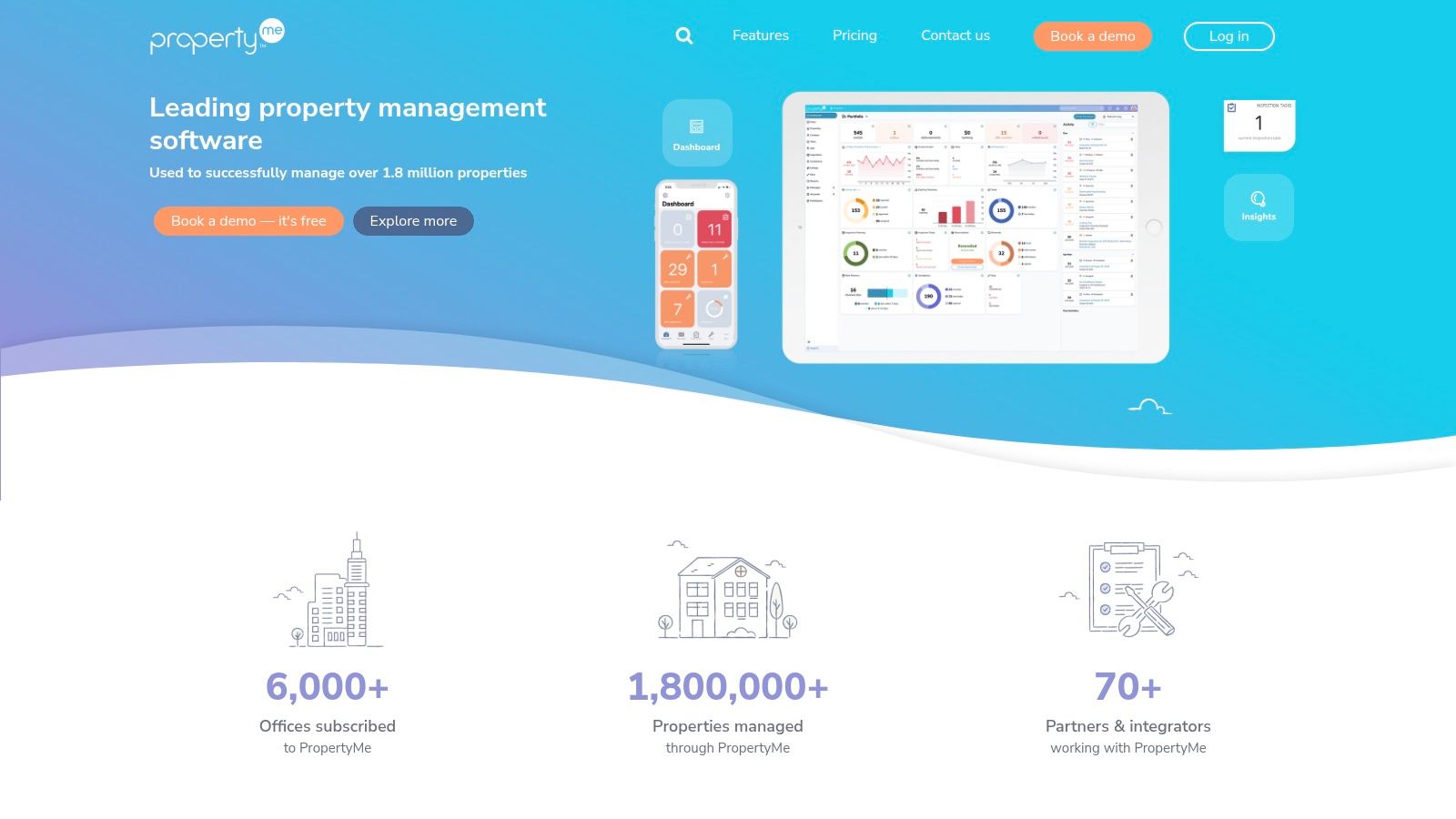
PropertyMe's core features include comprehensive property accounting with bank reconciliation, which simplifies financial reporting and ensures accurate record-keeping. Automated workflow tools help optimize routine tasks like rent collection, lease renewals, and maintenance requests, freeing up property managers to focus on more strategic activities. The interactive messaging system facilitates seamless communication between property managers, tenants, and owners, fostering transparency and responsiveness. Secure document management and storage capabilities ensure important files are readily accessible and organized. Dedicated owner and tenant portals, complete with payment integration, offer convenient self-service options and improve overall satisfaction.
Pros:
- User-friendly interface: PropertyMe is known for its intuitive navigation, making it easy to learn and use, even for those less tech-savvy
- Regular updates and improvements: The platform benefits from continuous development, with regular feature updates and improvements based on user feedback
- Strong trust accounting: PropertyMe's robust trust accounting capabilities are particularly beneficial in markets with stringent regulatory requirements, like Australia and New Zealand
- Excellent support: Users in Australia and New Zealand benefit from highly-rated customer support
Cons:
- Limited North American presence: While expanding globally, PropertyMe's presence and support infrastructure in North America are still developing. This is a key consideration for property managers operating in those markets
- Fewer third-party integrations: Compared to some competitors, PropertyMe offers a more limited range of integrations with third-party software
- Advanced reporting complexity: While basic reporting is straightforward, setting up more advanced, customized reports may require some technical expertise
- Data migration challenges: Migrating existing data from other platforms to PropertyMe can be complex and time-consuming, requiring careful planning and execution
Pricing and Technical Requirements: Pricing information isn't readily available on the website and often requires contacting sales. As a cloud-based platform, PropertyMe is accessible from any device with an internet connection, minimizing technical requirements.
Implementation Tips: When implementing PropertyMe, dedicate sufficient time for data migration and staff training. Take advantage of the available support resources and consider engaging with their implementation team for a smoother transition.
Comparison with Similar Tools: While PropertyMe shines in its core functionality and user-friendliness, competitors like AppFolio and Buildium offer more extensive third-party integrations and a longer track record in the North American market. Choosing the right platform depends on your specific needs and geographic location.
Why PropertyMe Deserves Its Place: PropertyMe earns its spot on this list due to its comprehensive feature set, user-friendly design, and strong focus on workflow automation. While its geographic focus may limit its appeal for some, its robust capabilities and commitment to continuous improvement make it a valuable option for property managers seeking a modern, efficient platform. For those in Australia and New Zealand, its strong local support and compliance with regional regulations make it a particularly compelling choice. You can explore more about PropertyMe on their website: https://www.propertyme.com/
6. Propertyware
Propertyware earns its spot in this property management software comparison because of its robust customization options and focus on financial reporting, making it particularly well-suited for managing single-family homes and dispersed multifamily units. If you're juggling a geographically spread-out portfolio and need a platform that can adapt to your unique business processes, Propertyware is worth considering. This platform provides a comprehensive solution encompassing accounting, tenant management, maintenance, and marketing, allowing you to streamline operations from a central hub.

Propertyware's strength lies in its adaptable dashboards and workflows. Unlike some other property management software options with rigid structures, Propertyware allows you to tailor the system to mirror your existing processes. This flexibility extends to reporting, where a custom report builder empowers you to generate in-depth financial analyses crucial for optimizing your portfolio's performance. Features like online tenant screening and applications, automated vacancy postings, and a work order management system further contribute to efficient property management. Its integrated accounting system, with a focus on trust accounting, provides a secure and transparent financial management solution.
For large portfolio owners and property management companies, Propertyware's robust API facilitates seamless integration with other business-critical applications. This interoperability allows for data synchronization and streamlined workflows across various platforms. Tenant placement companies will appreciate the marketing tools and tenant screening capabilities that streamline the leasing process. Single-family property managers, often dealing with numerous individual properties, can benefit from the platform's ability to manage scattered sites effectively.
Pros:
- Highly customizable platform: Adapts to specific business processes and workflows
- Strong reporting capabilities: Custom report builder offers granular financial insights
- Excellent for single-family and scattered site portfolios: Centralized management for dispersed properties
- Robust API: Enables seamless integration with other software solutions
Cons:
- Steeper learning curve: Extensive customization options can require more initial training
- User interface less modern: While functional, the interface may not be as visually appealing as some competitors
- Implementation can be time-consuming: Setting up customizations and integrations can take time
- Some users report occasional system performance issues: While not widespread, some users have experienced occasional slowdowns or glitches
Pricing & Technical Requirements:
Propertyware doesn't publicly list pricing. Contact their sales team for a customized quote based on your portfolio size and specific needs. Technical requirements are also not readily available, but it's a cloud-based solution accessible through a web browser, likely requiring a stable internet connection.
Comparison with Similar Tools:
Compared to platforms like AppFolio, which caters to a broader range of property types, Propertyware's focus on single-family and small multifamily makes it a more specialized solution. While Buildium offers similar features for smaller portfolios, Propertyware excels in its customization capabilities for larger, more complex operations.
Implementation/Setup Tips:
- Invest time in initial training: Take full advantage of Propertyware's training resources to master the customization options and maximize the platform's potential
- Clearly define your workflows: Before implementation, map out your current processes to ensure the platform is configured to match
- Test integrations thoroughly: If integrating with other software, rigorously test the connections to ensure seamless data flow
Website: https://www.propertyware.com/
7. Rentec Direct
Rentec Direct is a property management software solution specifically designed for landlords and property managers handling small to medium-sized portfolios. If you're looking for an affordable option that focuses on essential property management features without the complexity of larger, enterprise-level systems, Rentec Direct might be a good fit. This software prioritizes simplicity, affordability, and core functionality, making it easier for users to manage their properties efficiently without a steep learning curve. When performing a property management software comparison, Rentec Direct often stands out for its value proposition in this specific niche.
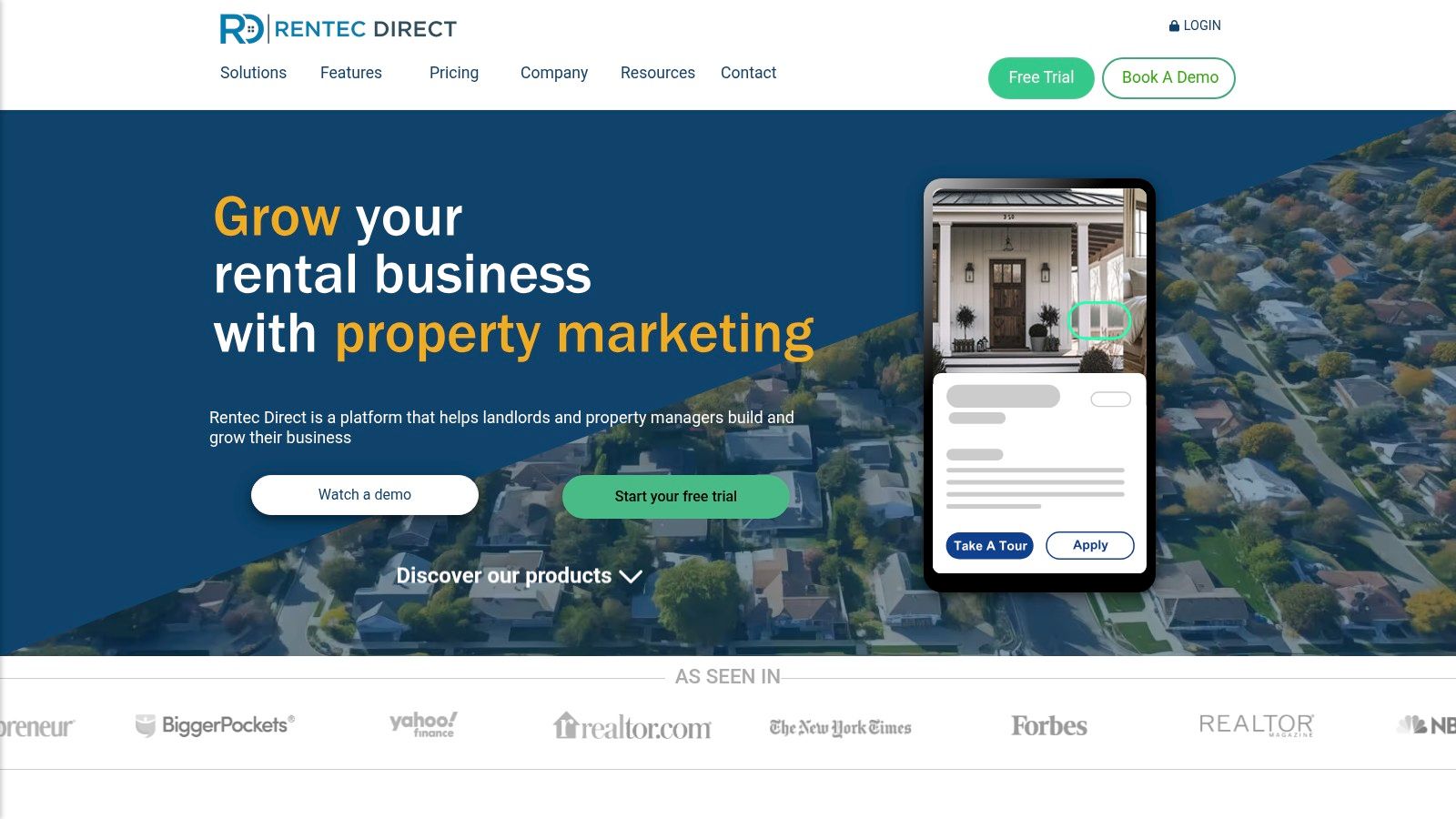
Rentec Direct offers a full accounting system with bank synchronization, simplifying financial tracking and reporting. Tenants can pay rent online through a dedicated portal, streamlining rent collection and improving communication. The platform also facilitates tenant screening and application processing, helping landlords find qualified renters. Additional features include document storage and sharing, and basic maintenance tracking. For single-family property managers or those with smaller portfolios, these tools can be sufficient to effectively manage daily operations.
Key Features:
- Full accounting system with bank syncing: Automate financial processes and reconcile transactions effortlessly
- Online rent collection and tenant portals: Simplify rent payments and improve communication with tenants
- Tenant screening and application processing: Streamline the tenant selection process with integrated tools
- Document storage and sharing: Securely store and share important documents with tenants and stakeholders
- Basic maintenance tracking: Manage maintenance requests and track progress efficiently
Pros:
- Excellent value for smaller portfolios: Rentec Direct provides a cost-effective solution for managing a limited number of properties
- Easy to learn and implement: The user-friendly interface minimizes the learning curve and allows for quick setup
- Responsive customer service: Users often praise Rentec Direct's helpful and accessible customer support
- No long-term contracts required: This provides flexibility and avoids vendor lock-in
Cons:
- Fewer advanced features for larger portfolios: Property management companies or large rental portfolio owners might find the feature set limiting as their needs grow
- Limited customization options: The software may not be as adaptable as some other solutions, restricting personalization options
- Less sophisticated reporting tools than enterprise solutions: Reporting capabilities are geared towards smaller portfolios and lack the depth found in enterprise-level software
- Mobile app has limited functionality compared to desktop: While a mobile app is available, its functionality is restricted compared to the desktop version, potentially hindering on-the-go property management
Pricing and Technical Requirements:
While specific pricing isn't included here, it's advised to visit the Rentec Direct website for the most up-to-date information. As for technical requirements, Rentec Direct is a cloud-based solution, so it is accessible from any device with an internet connection.
Comparison with Similar Tools:
Compared to other property management software options like AppFolio or Buildium, Rentec Direct caters specifically to the smaller portfolio market. AppFolio and Buildium offer more robust features and scalability, making them suitable for larger property management companies. However, this added complexity comes at a higher price point.
Implementation/Setup Tips:
Getting started with Rentec Direct is relatively straightforward. Take advantage of their resources, including tutorials and customer support, to quickly set up your account and import your property data.
Why Rentec Direct Deserves Its Place in the List:
In a property management software comparison, Rentec Direct stands out as a budget-friendly and easy-to-use option for landlords and property managers with small to medium-sized portfolios. Its emphasis on core functionality and simplicity makes it an attractive alternative to more complex and expensive solutions. For users within its target market, Rentec Direct offers excellent value and a streamlined property management experience.
Website: https://www.rentecdirect.com/
8. MRI Software
MRI Software is a powerful contender in the property management software comparison landscape, catering to a wide range of users, from single-family property managers to large-scale commercial real estate companies. Its comprehensive suite of tools offers a robust solution for property management and accounting, making it a particularly strong choice for those with complex needs and large portfolios. MRI distinguishes itself through its enterprise-grade capabilities, flexibility, and extensive customization options, allowing it to adapt to various property management styles and business requirements. This makes it a valuable option for businesses looking for a long-term, scalable solution.
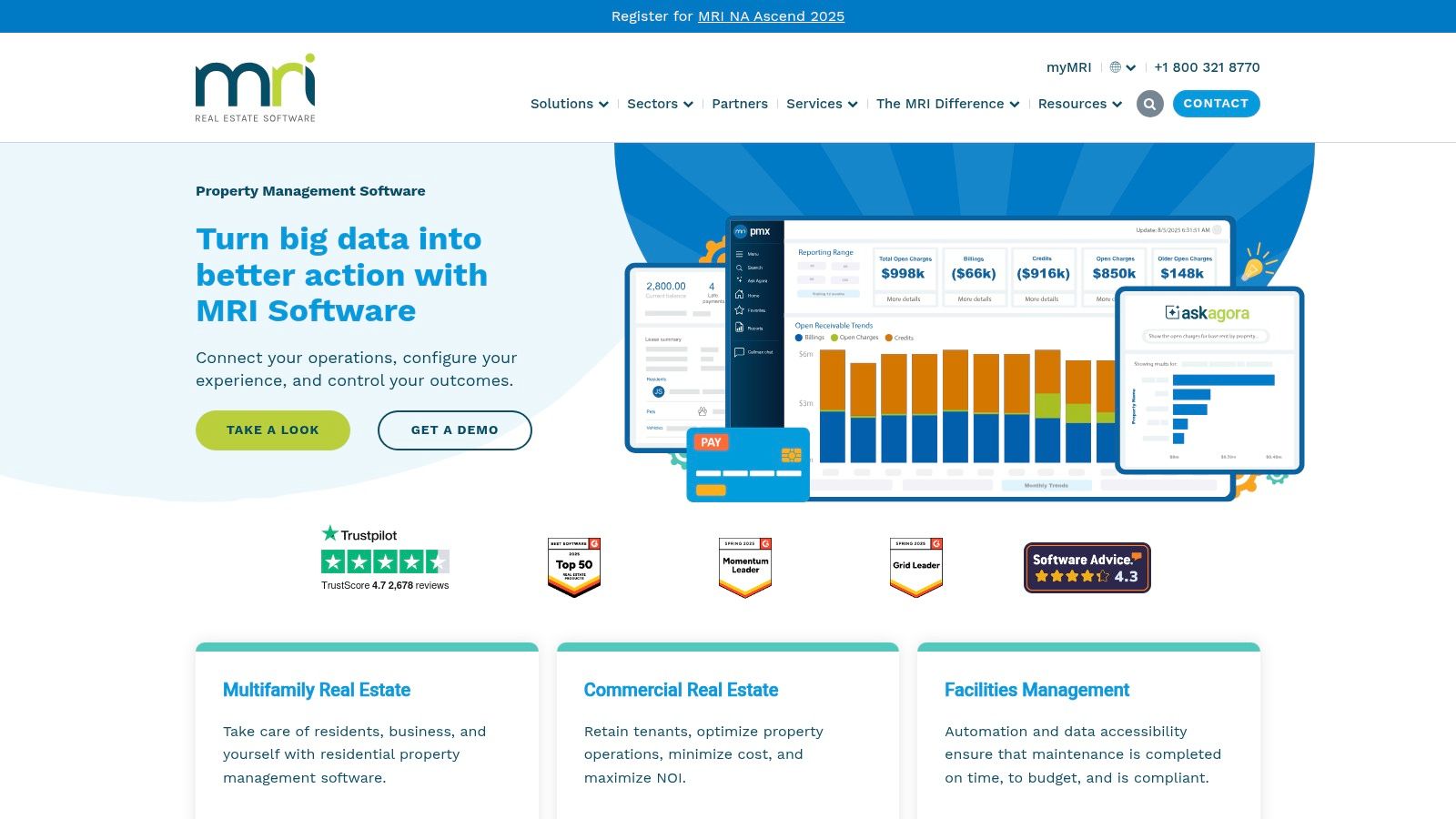
For large rental portfolio owners and property management companies, MRI's enterprise-grade accounting and financial reporting tools are a significant advantage. Features such as business intelligence and advanced analytics provide valuable insights into portfolio performance, allowing for data-driven decision-making. Comprehensive lease management functionalities streamline operations, automating critical tasks and reducing manual workload. Tenant placement companies will also appreciate these features, as they can easily manage tenant applications, screenings, and lease agreements within a centralized system.
MRI's extensive third-party integration marketplace is another key differentiator in this property management software comparison. It allows users to connect with a wide range of other software solutions, creating a seamless flow of information across different platforms. This level of integration streamlines workflows and enhances efficiency by minimizing data silos. Configurable workflows and automation further contribute to optimizing operations and freeing up time for strategic tasks.
Features:
- Enterprise-grade accounting and financial reporting
- Business intelligence and advanced analytics tools
- Comprehensive lease management
- Extensive third-party integration marketplace
- Configurable workflows and automation
Pros:
- Highly scalable from medium to enterprise-level portfolios
- Exceptional flexibility and customization options
- Strong commercial property management capabilities
- Extensive ecosystem of specialized add-on modules
Cons:
- Higher price point than many competitors
- Can be complex to implement and configure fully
- Steeper learning curve for new users
- May require professional services for optimal setup
Website: https://www.mrisoftware.com/
Pricing and Technical Requirements: While specific pricing information isn't publicly available, MRI Software typically operates on a quote-based system, tailored to the specific needs and size of the client. Technical requirements will vary depending on the chosen configuration and integrations. Contact MRI directly for detailed pricing and technical specifications.
Implementation/Setup Tips:
- Engage with MRI's professional services: Given the complexity of the system, leveraging their expertise for implementation and configuration is highly recommended, especially for larger organizations
- Clearly define your requirements: Before implementation, thoroughly outline your specific needs and workflows to ensure a tailored setup
- Invest in training: Adequate training is crucial for users to effectively navigate and utilize the software's full potential
MRI Software deserves its place on this list because it offers a robust and comprehensive solution for property managers with complex needs, particularly those managing large and diverse portfolios. While the complexity and higher price point might make it less suitable for smaller independent landlords, its scalability, customization, and powerful features make it a strong contender in the property management software comparison for larger organizations and those seeking an enterprise-grade solution. If you are looking for a highly adaptable and feature-rich system, MRI Software is worth serious consideration.
9. Entrata
Entrata stands out in this property management software comparison as a robust, all-in-one platform designed specifically for multifamily properties and student housing. Its single-login system offers a unified experience across all its tools, streamlining operations and improving overall efficiency. From attracting prospective tenants to managing ongoing maintenance, Entrata provides a comprehensive suite of tools intended to optimize property performance and boost resident satisfaction. This makes it a particularly strong contender for property management companies and large rental portfolio owners seeking a centralized solution.
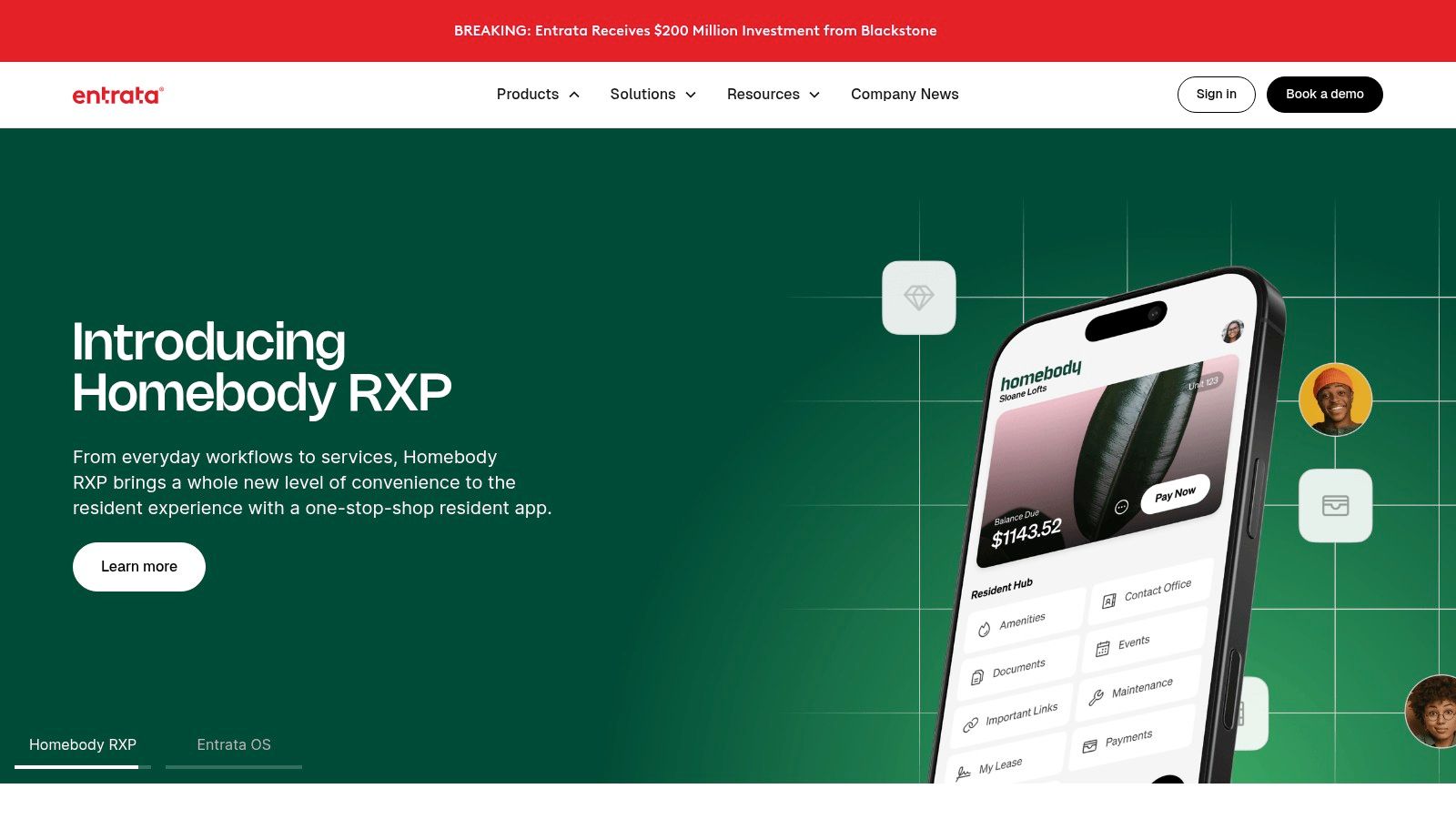
Entrata's key features contribute significantly to its comprehensive approach: LeadManager CRM and marketing tools help attract and manage leads, the ResidentPortal facilitates online payments and communication, and the facilities management system streamlines maintenance requests and tracking. Advanced reporting and business intelligence tools offer valuable insights into property performance, empowering data-driven decisions. This integrated approach eliminates the need for multiple disparate systems, simplifying workflows and enhancing productivity. While single-family property managers or those handling commercial properties may find its feature set overly robust, Entrata is a powerful solution for those managing large multifamily portfolios.
Features:
- All-in-one platform with single login for all tools
- ResidentPortal with online payment processing
- LeadManager CRM and marketing automation tools
- Comprehensive facilities management system
- Advanced reporting and business intelligence
Pros:
- Comprehensive all-in-one platform with unified user experience
- Strong marketing and leasing tools specifically designed for multifamily
- Excellent resident experience features, including online portals and communication tools
- Good balance of power and usability, making it accessible despite its comprehensive feature set
Cons:
- Primarily focused on larger multifamily properties, potentially overwhelming for smaller landlords or those managing diverse portfolios
- Higher pricing tier than simpler solutions, reflecting its robust functionalities. Contact Entrata directly for specific pricing details, as it is typically tailored to individual portfolio size and needs
- Less suitable for single-family or commercial properties due to its multifamily focus
- Some users report occasional challenges with customer support, though this is not universally experienced
Implementation/Setup Tips:
While Entrata handles the technical setup, a successful implementation requires careful planning and data migration. Engage with their implementation team early to ensure a smooth transition and leverage their expertise for optimal configuration. Prioritize staff training to maximize the benefits of the platform's comprehensive features.
Comparison with Similar Tools:
Compared to simpler property management software solutions like AppFolio Property Manager or Buildium, Entrata offers a more robust and specialized feature set for multifamily properties. While AppFolio and Buildium cater to a broader range of property types, Entrata's in-depth focus on multifamily allows it to offer more specialized tools for this specific market segment. For large multifamily portfolios, Entrata's comprehensive features and integrated approach often justify the higher price point.
Website: https://www.entrata.com/
Entrata earns its place in this property management software comparison due to its powerful, integrated platform designed specifically for the complexities of large multifamily properties. While not suitable for all, its comprehensive features, resident-focused tools, and sophisticated reporting capabilities make it a valuable asset for property management companies striving for operational efficiency and enhanced resident satisfaction in the multifamily market.
10. TenantCloud
TenantCloud offers a compelling solution in the property management software comparison landscape, particularly for smaller landlords and property managers seeking an affordable and easy-to-use platform. It focuses on providing essential features for efficient rental property management without the complexity and cost of more robust systems. This makes it a valuable contender for those just starting out or managing a smaller portfolio. Its user-friendly approach is ideal for users with limited technical expertise.
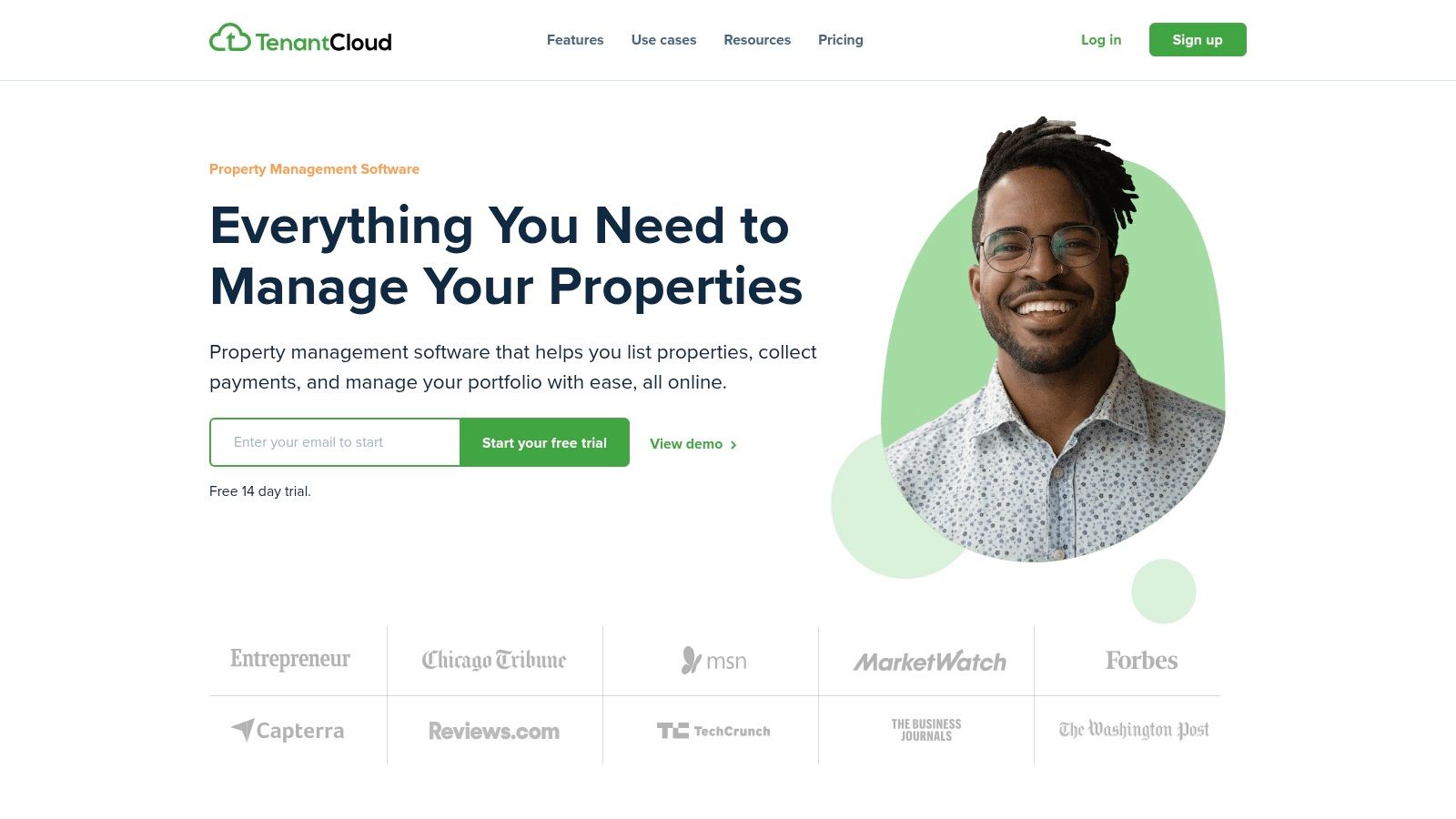
TenantCloud stands out for its tiered pricing model, including a free basic plan tailored for smaller landlords (up to 75 units). This free tier allows users to experience the core functionalities of the software before committing to a paid subscription. Paid plans offer additional features and support larger portfolios, scaling with your business needs. This makes TenantCloud an attractive option in any property management software comparison, especially for those conscious of budget. While pricing details for larger portfolios aren't readily available on the website, potential users can contact TenantCloud directly for specific quotes. Technical requirements are minimal, simply requiring a device with internet access, making it accessible from virtually anywhere.
Key features useful in day-to-day property management include online rent collection and payment tracking, simplifying financial administration and offering transparency for both landlords and tenants. The maintenance request management system streamlines communication and organization related to property repairs, ensuring timely responses to tenant issues. Integrated marketing tools with listing syndication help advertise vacancies across multiple platforms, broadening reach and potentially reducing vacancy periods. Furthermore, TenantCloud facilitates tenant screening and application processing, crucial for mitigating risk and ensuring responsible tenant selection.
While TenantCloud offers a valuable suite of tools, it's essential to acknowledge its limitations within a property management software comparison. Its accounting features are less comprehensive than dedicated accounting software, which might necessitate integration with other financial platforms for more complex accounting needs. Larger portfolio owners and property management companies might find the feature set less robust compared to enterprise-grade solutions like AppFolio or Buildium. Some users have reported occasional delays in customer service response times, a factor to consider if immediate support is a critical requirement. Finally, while a mobile app is available, its functionality is currently more limited than the desktop version.
Features:
- Free basic plan for up to 75 units
- Online rent collection and payment tracking
- Maintenance request management system
- Integrated marketing tools with listing syndication
- Tenant screening and application processing
Pros:
- Very affordable with a generous free tier
- User-friendly interface with minimal learning curve
- Good mobile functionality for on-the-go management
- Active development with regular new features
Cons:
- Limited accounting capabilities compared to dedicated solutions like QuickBooks or AppFolio. For more robust accounting, integration with other software might be necessary
- Some advanced features, such as advanced reporting and marketing automation, are only available in higher-tier plans
- Customer support can be slower compared to premium alternatives
- Lacks sophisticated leasing automation and compliance features
Implementation Tip: Start with the free plan to explore the interface and functionalities. Utilize the online resources and knowledge base provided by TenantCloud to familiarize yourself with the platform.
Comparison: Compared to similar tools like Cozy (now Apartments.com), TenantCloud offers more comprehensive features, including marketing tools and maintenance management. However, Cozy boasts a more polished mobile experience.
Why TenantCloud deserves its place on this list: Its affordability, user-friendly interface, and essential feature set make it a valuable option for small to mid-sized landlords and property managers seeking an accessible and efficient property management solution. The free plan makes it a risk-free option for those looking to explore property management software without a large upfront investment. Visit their website https://www.tenantcloud.com/ for more information and to sign up.
Top 10 Property Management Software Comparison
PlatformCore Features & AutomationUser Experience & QualityValue & PricingTarget AudienceUnique Selling Points#1 ShowdigsAI-backed leasing automation, flexible showings (in-person, virtual, self-schedule), HUD compliance built-in, seamless PMS integrations★★★★★ Intuitive platform, excellent customer supportSubscription-based, best for large portfoliosProperty managers with 200+ doorsBuilt-in HUD compliance + AI pre-screening + on-demand agent tours + customizable workflow#2 AppFolioAI leasing assistant (Lisa), automated showings, smart maintenance, enterprise PM suite★★★★★ Modern UI, top-rated supportHigher fees, tier-based, min 50 unitsPortfolios 50+ units, residential & commercial24/7 AI assistant + automated showing coordination + dedicated account managers + enterprise analytics#3 BuildiumFull accounting, rent collection, maintenance tracking, resident portals★★★★ Strong mobile app, scalableHigher pricing tiersResidential, student, affordable & community housingComprehensive all-in-one solution + strong accounting focus#4 Yardi BreezeSimplified accounting, portals, leasing, marketing tools★★★★ Intuitive, minimal training neededAffordable for smaller portfoliosSmall to mid-sized portfoliosEasy-to-use + no long-term contract#5 PropertyMeAccounting, workflow automation, messaging, document management★★★★ User-friendly, regular updatesCompetitive in AustraliaResidential & commercial in Australia/NZStrong trust accounting + workflow efficiency#6 PropertywareCustom dashboards, accounting, tenant screening, robust API★★★ Flexible but less modern UIModerate pricingSingle-family & scattered site portfoliosHigh customization + robust API#7 Rentec DirectAccounting, rent collection, tenant screening, document storage★★★★ Easy to learn, responsive serviceAffordable for small/medium portfoliosSmall to medium landlordsSimple + cost-effective#8 MRI SoftwareEnterprise accounting, BI tools, lease management, extensive integrations★★★ Highly scalable, complexHigh price, enterprise-levelMedium to large portfolios, commercial & residentialExtensive customization + integrations#9 EntrataAll-in-one platform, CRM, marketing, facilities management★★★★ Unified UX, powerfulHigher pricing tierMultifamily & student housingSingle-login platform + excellent resident features#10 TenantCloudFree basic plan, rent collection, maintenance, marketing★★★ User-friendly, simple setupAffordable, free option availableSmall to mid-sized landlords & managersFree tier + essential features
Making the Best Choice for Your Property Management Needs in 2026
This property management software comparison has explored ten leading platforms in 2026: Showdigs, AppFolio, Buildium, Yardi Breeze, PropertyMe, Propertyware, Rentec Direct, MRI Software, Entrata, and TenantCloud. Each solution offers unique features catering to different needs and portfolio sizes.
Key Considerations for 2026:
The property management software landscape has evolved significantly, and several factors have become critical when evaluating solutions:
- Built-in Compliance: With increasing regulatory scrutiny, platforms with built-in HUD and Fair Housing compliance (like Showdigs) eliminate legal risk and ensure every process meets federal requirements automatically
- AI-Powered Automation: Modern platforms leverage AI for intelligent lead scoring, automated prospect communication, and predictive analytics that improve decision-making
- Leasing Specialization vs. All-in-One: Determine whether you need specialized leasing automation (Showdigs) or comprehensive property management with integrated leasing (AppFolio, Buildium)
- Portfolio Size & Type: Single-family managers have different needs than multifamily or commercial operators
- Integration Ecosystem: Ensure your chosen platform connects seamlessly with existing systems (accounting, marketing, access control)
- Pricing Transparency: Understand total cost of ownership, including per-unit pricing, transaction fees, and add-on costs
- Mobile Functionality: On-the-go management capabilities are no longer optional—they're essential
Choosing the best software depends entirely on your specific requirements. Single-family property managers might prioritize ease of use, built-in compliance, and leasing automation, while large rental portfolio owners will likely need robust reporting and advanced automation. Consider factors such as the number of units you manage, your budget, required integrations (like accounting software), and the technical proficiency of your team. Taking advantage of free trials and demos offered by most providers is essential in making an informed decision.
Implementing new software requires careful planning and training to ensure a smooth transition and maximize its benefits. Consider involving your team in the decision-making process and provide adequate training to maximize adoption and efficiency. The right property management software can transform your business, boosting productivity, improving tenant satisfaction, and ultimately increasing your profitability.
Looking for the complete solution?
For single-family property managers seeking to reduce vacancy times, improve tenant quality, and maintain automatic regulatory compliance, Showdigs offers a purpose-built platform that combines AI-powered leasing automation with built-in HUD compliance and on-demand professional agents. Explore Showdigs, a leading contender in the property management software landscape, and discover how it can simplify your operations and enhance your business.
.png)
Frequently Asked Questions
What's the most important factor when comparing property management software?
Alignment with your portfolio type and size is paramount. Single-family managers need scattered-site features (like Showdigs' on-demand agents), while multifamily operators need centralized leasing (like Entrata). Beyond that, built-in compliance automation, integration ecosystem, and total cost of ownership determine long-term success.
How do I calculate the true cost of property management software?
Look beyond base subscription fees. Calculate per-unit costs, transaction fees for rent payments, charges for additional users, costs for premium features, and integration fees. For example, platforms charging per-text or per-call (like Tenant Turner) can have wildly variable monthly costs. Request all-inclusive pricing to avoid surprises.
Can I switch property management software without losing data?
Yes, but migration complexity varies. Most platforms offer data import tools and migration support. Simple platforms (TenantCloud, Rentec Direct) have straightforward exports. Enterprise platforms (AppFolio, MRI) often include professional migration services. Plan for 2-8 weeks of parallel operation during transitions to ensure data accuracy.
Do property managers prefer cloud-based or on-premise software?
Cloud-based platforms dominate in 2026 due to accessibility, automatic updates, and lower IT overhead. All platforms on this list are cloud-based. On-premise solutions are essentially obsolete except for massive enterprises with specific security requirements. Cloud platforms enable mobile management and remote team coordination.
What's the difference between property management software for residential vs. commercial properties?
Commercial property management requires lease administration for complex multi-year contracts, CAM reconciliation, tenant improvement tracking, and sophisticated financial reporting. Residential platforms focus on shorter leases, tenant turnover, showing coordination, and maintenance. Platforms like MRI handle both; most others specialize in residential.
How important are mobile apps for property management software?
Critical for modern property management. Managers need to respond to maintenance requests, approve applications, and communicate with tenants on-the-go. Tenants expect mobile rent payment and maintenance request submission. Evaluate mobile functionality during demos—platforms like AppFolio and Showdigs offer robust mobile experiences.
Should I prioritize specialized leasing tools or comprehensive property management?
If leasing is your primary pain point and you have adequate systems for accounting/maintenance, specialized leasing platforms (Showdigs) deliver superior results. If you need comprehensive management or lack existing systems, all-in-one platforms (AppFolio, Buildium) eliminate tool sprawl. Many managers use specialized leasing software integrated with comprehensive PM systems.
What security features should property management software include?
Essential security features include two-factor authentication, encrypted data transmission and storage, regular security audits, SOC 2 compliance, role-based access controls, and automatic backups. Platforms handling financial transactions (rent payments) should be PCI-DSS compliant. Enterprise platforms like AppFolio and MRI maintain rigorous security standards.
How does AI improve property management software in 2026?
AI automates lead qualification, provides 24/7 prospect responses (AppFolio's Lisa), predicts maintenance needs, optimizes pricing, and ensures compliance. Showdigs uses AI for identity verification, listing protection, and smart scheduling. These features reduce manual work, accelerate leasing, and improve decision-making quality across portfolios.





.png)

.png)